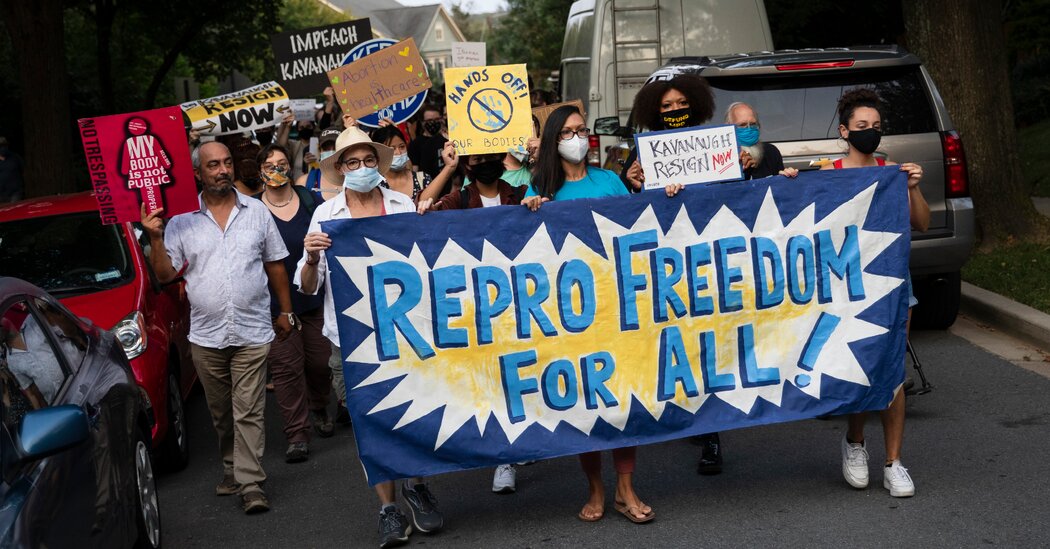
WASHINGTON — Justice Brett M. Kavanaugh signed the recent majority opinion that overruled Roe v. Wade. He also issued a 12-page concurring opinion, writing only for himself. He wanted to discuss, he wrote, “the future implications” of the decision.
“Some of the other abortion-related legal questions raised by today’s decision are not especially difficult as a constitutional matter,” he wrote. “For example, may a state bar a resident of that state from traveling to another state to obtain an abortion? In my view, the answer is no based on the constitutional right to interstate travel.”
A few hours later, Rory Little, a law professor at the University of California’s Hastings College of the Law, noted a bit of irony on Twitter: “Justice Kavanaugh votes to overrule abortion protections because not specifically mentioned in the Constitution — and then his concurrence relies on an unwritten ‘constitutional right to interstate travel.’”
You will indeed search the Constitution in vain for the word travel, just as you will not find the word abortion. And though some form of a constitutional right to travel is almost uniformly accepted, the Supreme Court has struggled to say exactly where to find it or precisely how to define it.
“We need not identify the source of that particular right in the text of the Constitution,” Justice John Paul Stevens wrote in a 1999 decision of “the right of a citizen of one state to enter and to leave another state.”
Similarly, Justice William J. Brennan Jr. wrote for the court in 1969 that “we have no occasion to ascribe the source of this right to travel interstate to a particular constitutional provision.”
Justice Kavanaugh, for his part, cited no precedents or constitutional provisions for his statement that a state may not “bar a resident of that state from traveling to another state to obtain an abortion.”
The real-world issue, in any event, is not whether women seeking abortions would be stopped at the state’s border but rather what would happen afterward — to the women, to those who helped them travel and to out-of-state abortion providers.
Those questions, a timely draft article cited in the dissent said, present a complicated and contested array of issues. The article, “The New Abortion Battleground,” which is to be published in The Columbia Law Review, was written by three law professors: David S. Cohen of Drexel University, Greer Donley of the University of Pittsburgh and Rachel Rebouché of Temple University.
The prospect of states trying to stop abortions beyond their own borders is not fanciful, Professor Rebouché said.
“We should be worried that states will start throwing everything at the wall to see what sticks,” she said. “There is an unknown universe of what’s ahead.”
Missouri legislators have twice considered, but so far have not adopted, bills that would restrict residents’ ability to obtain abortions in other states. The more recent of them borrowed from the innovation of the Texas law that succeeded in banning most abortions in that state after six weeks of pregnancy — 10 months before the court overruled Roe.
Like the Texas law, the Missouri bill relied on private enforcement through civil lawsuits, shielding it from many legal challenges. Anti-abortion groups have also drafted model laws that reach beyond state borders, and abortion rights groups fear a wave of such legislation.
Even the prospect of such statutes seems to have had a chilling effect. In Montana, for instance, Planned Parenthood clinics said recently that they would require proof of residency for women seeking abortion pills.
“It is going to get incredibly messy and complicated,” Professor Donley said, adding that Justice Kavanaugh’s statement offered “literally no protection” to out-of-state doctors and clinics who provide abortions to women from states where the procedure is illegal.
Justice Kavanaugh’s description of the scope of the right to travel, which responded to a question in the dissent, was oddly limited, said Seth Kreimer, a law professor at the University of Pennsylvania and the author of two foundational law review articles exploring the right to travel in the context of abortion.
The right to interstate travel, he said, “is fairly solidly rooted in constitutional structure and longstanding constitutional practice.” But that is only part of the puzzle.
“Read closely,” Professor Kreimer said of Justice Kavanaugh’s statement, “he may not even suggest protection against prosecuting the resident upon her return — or seeking to sanction doctors in sanctuary states either by prosecution or damage actions.”
Had Justice Kavanaugh wanted to cite a Supreme Court precedent that seems both apt and expansive, he might have chosen Bigelow v. Virginia, a 1975 decision that overturned the conviction of a newspaper editor who published an advertisement in Virginia for abortion services in New York when abortions were illegal in Virginia.
The case turned on the First Amendment, but the author of the majority opinion, Justice Harry A. Blackmun, made some broader points, too.
“The Virginia Legislature could not have regulated the advertiser’s activity in New York, and obviously could not have proscribed the activity in that state,” he wrote. “Neither could Virginia prevent its residents from traveling to New York to obtain those services or, as the state conceded, prosecute them for going there. Virginia possessed no authority to regulate the services provided in New York.”
Justice Kavanaugh’s statement was much narrower, Professor Kreimer said. “Kavanaugh hasn’t committed himself to protection of anything beyond ‘travel,’” he said. “So, while robust protection could emerge, it’s not an outcome that one can rely upon.”




